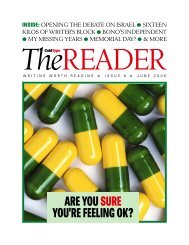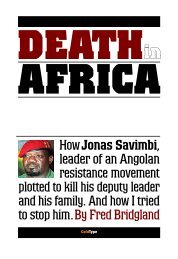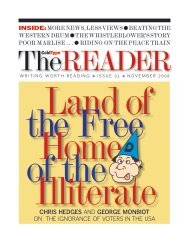UPDATED - ColdType
UPDATED - ColdType
UPDATED - ColdType
- TAGS
- updated
- coldtype
- coldtype.net
Create successful ePaper yourself
Turn your PDF publications into a flip-book with our unique Google optimized e-Paper software.
EMBEDDED: WEAPONS OF MASS DECEPTION<br />
programs in the tone in which the President was<br />
covered. ABC World News Tonight was very<br />
polarized in its portrayal of Mr Bush as the Commander-in-Chief,<br />
with an equal 19.4% positive and<br />
negative average implicit and explicit statements<br />
with the President as the subject – a number of<br />
negative statements on par with those of most<br />
European news programs.<br />
On NBC, the tone of the coverage was clearly<br />
more positive, while the difference between positive<br />
and negative statements was most glaring<br />
on NBC, where it was explicitly or implicitly positive<br />
41.9% of the time the President was its subject,<br />
compared to 7% negative statements.<br />
While U.S. news programs portrayed the President<br />
and the war in a more positive light overall,<br />
they nevertheless did so from different angles<br />
and at different degrees of enthusiasm, leaving<br />
us to wonder to which extent ideological differences<br />
may account for variations in the news<br />
coverage. These differences become more<br />
apparent when we look at the frequency with<br />
which voices of dissent were featured on the<br />
news.<br />
German TV presented a different reality: its<br />
bias become obvious in the newscasters’ evaluation<br />
of U.S. military actions. In the beginning of<br />
the war one out of five verbal or visual portrayals<br />
by RTL journalists was negative, only six percent<br />
of all statements on the Americans were<br />
positive. The coverage was particularly critical<br />
by the end of March, as U.S. advances, according<br />
to the journalists, were beginning to slow down<br />
and the end of the war was not yet in sight,.<br />
Instead, there was talk of the threats of house-tohouse<br />
fighting or the deployment of biological<br />
and chemical weapons. The BBC, on the other<br />
hand, assessed the American war effort in an<br />
270<br />
overall balanced manner, despite American<br />
‘friendly fire’ incidents leading to the deaths of<br />
British troops.<br />
In the Czech Republic, a member of the war<br />
alliance, the assessment of U.S. military actions<br />
was slightly negative, while in South Africa a<br />
more differentiated picture emerges: Whereas<br />
the public broadcaster, English-language SABC<br />
NEWS portrayed the American military more<br />
positively than negatively, the private television<br />
station E-TV criticized them harshly. This program,<br />
which targets South Africans of Indian origin<br />
ended their newscasts day after day with the<br />
same remark. So far, E-TV would say, the Americans<br />
have not found any weapons of mass<br />
destruction. Of all analyzed media, only the BBC<br />
maintained an equilibrium of sorts of positive<br />
and negative coverage, mostly remaining<br />
ambivalent in tone, with far fewer explicitly positive<br />
or negative statements than its German or<br />
U.S. counterparts.<br />
International differences became even clearer<br />
when it came to the choice of protagonists of the<br />
news coverage. In the U.S., more than half of the<br />
protagonists of news stories on the war were<br />
either U.S. politicians or military personnel<br />
(ABC: 53%; NBC: 54%; NBC: 58.1%), more than<br />
twice as many as on the average foreign news<br />
program.<br />
More tellingly, while TV news outside of the<br />
U.S. made frequent reference to British and<br />
other coalition troops, British troops figured little<br />
in U.S. coverage of the war and coalition<br />
troops from other countries played almost no<br />
role at all. U.S. TV news coverage was thus<br />
arguably as unilateral as the actions of the Bush<br />
administration, a point further illustrated by<br />
comparing the amount of coverage on military

















